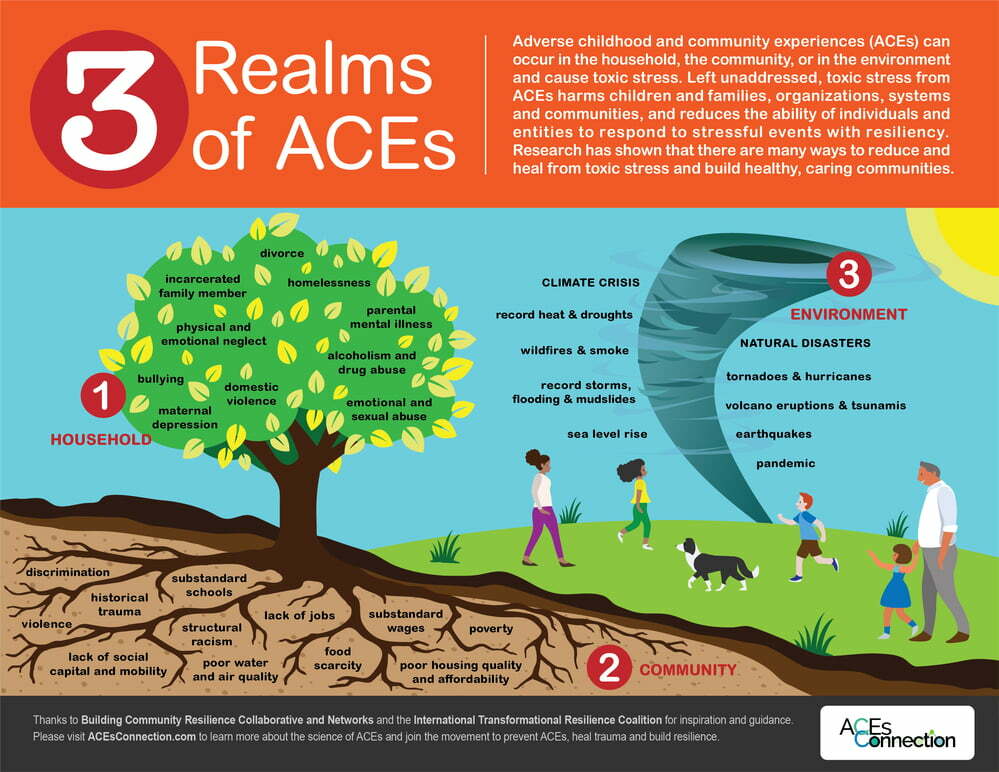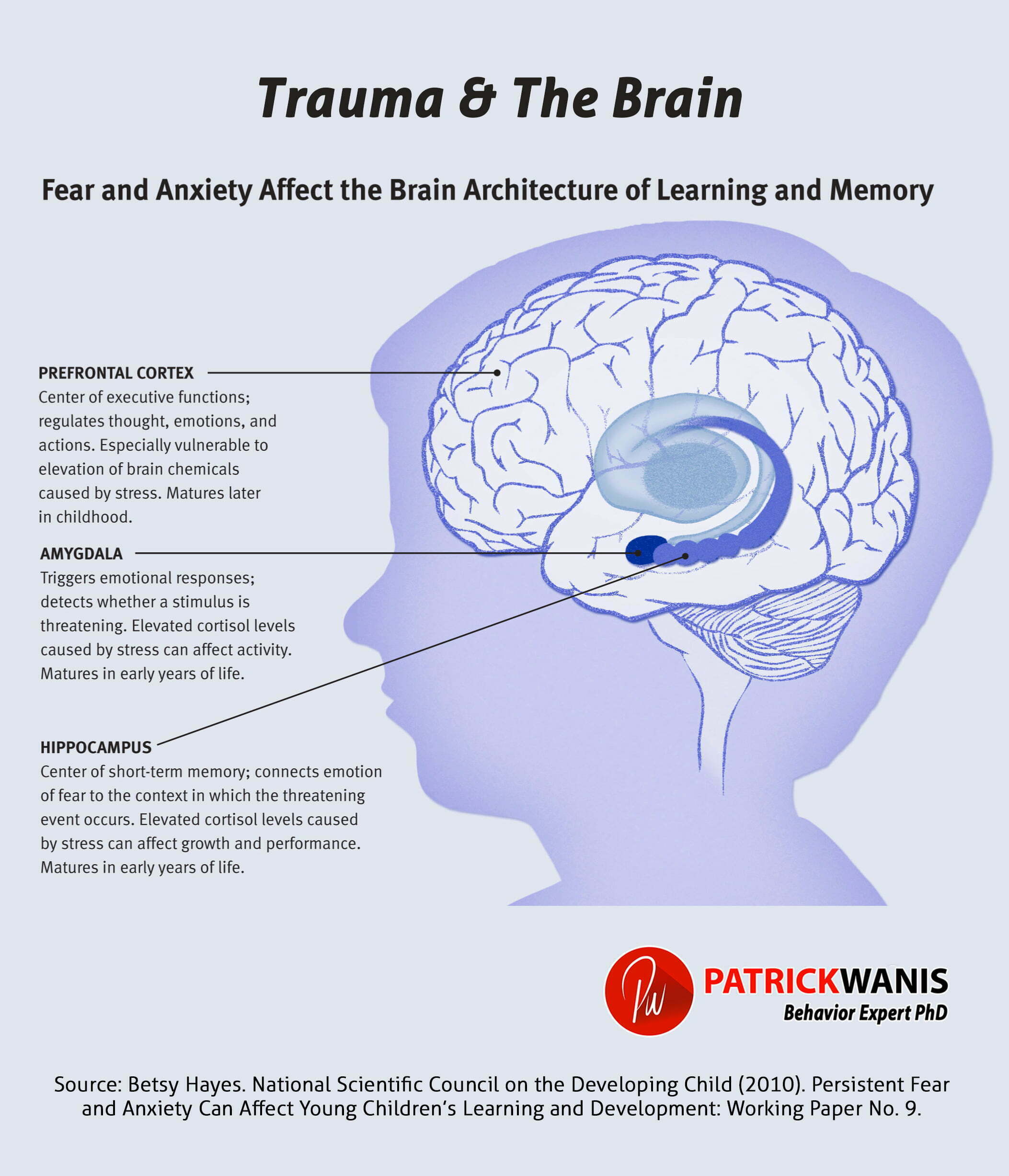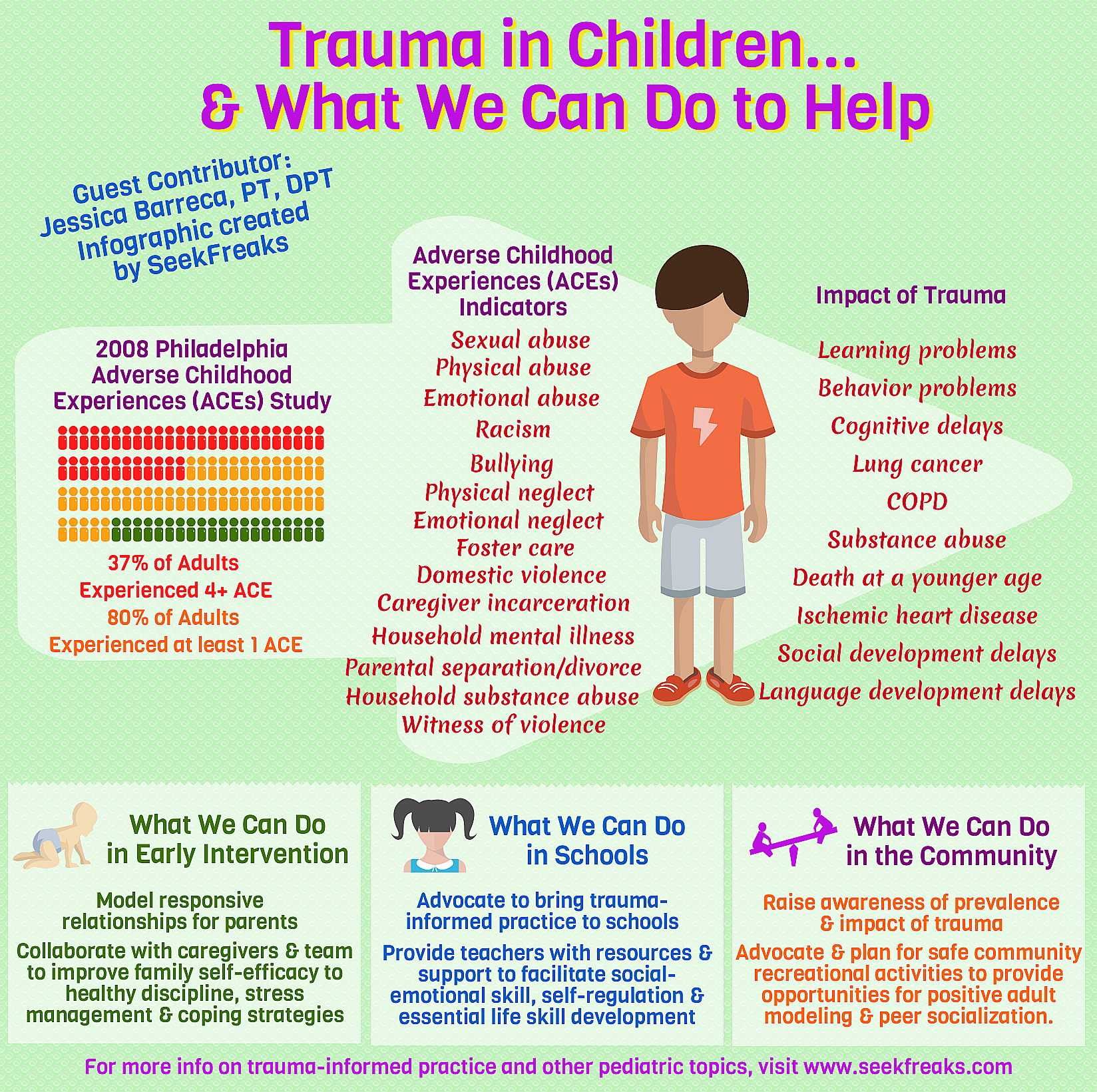ACEs means Adverse Childhood Experiences. This can also be referred to as Child Traumatic Stress, and this focuses on the physical and emotional responses of a child to events that threaten the life or physical well being of the child or of someone very important to the child. These events can also consume a child’s ability to cope. This also causes children the inability to adapt, and increases the long term risks of mental illness, incarceration, homelessness, domestic violence, substance abuse, and physical/emotional neglect. This week I learned a lot about trauma, the types of trauma, and the long term effects that trauma has on individuals. Doing this lecture caused me to reflect on my peers and how they may have experienced trauma based off of the thing that they endure from the people they love, which I was able to reference from this week's lecture. ACEs are basically seen as traumatic events that occur within a child's life prior to them reaching adulthood, this can include various types of abuse and neglect. This study first was introduced because there was a linked connection done within research in regards to trauma and the longterm effects it has on stability within adulthood. When looking at these experiences, this information is definitely sticking with me and has shifted my teaching approach in my current profession. I currently work in an ABA field, and we work with medical insurance that is covered by the state. This allows us to work with children from multiple economic backgrounds, and with my gaining of understanding on the types of trauma and what comes as a result of trauma, I am now able to shift my approach in regards to my awareness of the behaviors that might be seen within children who are or have experienced trauma. In regards to my future profession, I ultimately want to work with at risk youth and I believe this week’s lecture will definitely stick with me as far as long term because this is a topic that has definitely interested me on a deeper and broader aspect, but it also makes me want to learn more because you truly never know who is suffering in silence until you are able to identify the antecedents of the effects of something like this, described.

https://www.kolotv.com/2022/04/03/three-suffer-life-threatening-injuries-east-reno-crash/
This news article describes the traumatic results that come from parents battling addictions daily. The headline reads “Three suffer life threatening injuries in east Reno crash. This car accident occurred on April 3, 2022 in Reno, NV around approximately 10:30 pm. The officer described the scene as having a result of road closures that were in effect for more than 7 hours while officers investigated the scene. The police department said the woman driving a Chevrolet had gone off road and hit a tree with two children in the car ages nine and three years old. None of the occupants in the vehicle had a seatbelt on and the officers believed speed and impairment were factors in the crash. This can be seen as an example of Complex Trauma because this describes both exposure to chronic trauma. This trauma was caused by a trusted caregiver, and overall this affects nearly every aspect of a child’s development because of the severe trauma and injuries that comes as a result of this occurring. This event is something that will definitely have a severe effect on all individuals involved, especially the innocent children who were helpless victims in this situation. Car accidents overall can be very terrifying for children but the emotional distress that they had to endure during this event is what can haunt them in the long term of their life. Children often have nightmares, anxiety, lack of confidence and self worth, and depression. There are also different effects depending on the child. In particular to this case, the child who is nine years old will more than likely suffer severely more in comparison to the child that is three years old because of the lack of memory at that age. When looking at trauma anything pertaining to children five and under typically end up reverting back to past behavior patterns that come as a result of trauma. This can be things like urinating on themselves, feeling anxious alone or in the dark, and often having a high dependency on a parent along with constantly being afraid to be without them. When looking at children ages six to eleven children who experience severe trauma as a result of a car accident tend to begin to withdraw and have sleep issues which can also include nightmares. Along with this children also can begin to have challenging behavior as a result of this which can be in school or at home, which also surrounds the inability to focus due to anxiety along with head and body pain.
When looking at the incident and the trauma that can come as a result of this event, then referencing the resources we have covered in this course pertaining to stress there are various examples that we can find connections too. Some of the behaviors that can be seen immediately as a result of trauma would be struggles of processing or tolerating emotions. An example of this would be that children who have experienced complex trauma often internalize or overly externalize their emotions, this in the long term aspect can result in severe depression, anxiety, or anger that is later commonly seen within the child. As mentioned on The National Child Trauma Stress Network, another immediate effect would be self concept and future orientation, in this instance when looking at the children involved in this car accident, these children are more likely to have little to no trust and gain a perception of the world and how unsafe it truly is. The woman in the car with the children was an immediate family member to them, aside from judging ideally if substance abuse played a role in this incident and the children along with the woman were not wearing seatbelts shows the lack of structure that may reflect at home. This will cause the children that have trouble seeing the bigger picture in life, and instead placing themselves in a survival mode mindset as a defense mechanism, which prohibits children from setting up an ideal goal or envisioning a future for themselves. One of the major long term impacts that come as a result of complex trauma that we can also connect to this article would be the long term health consequences. There has been a substantial increase in medical conditions throughout individuals' lives who experience trauma. Research shows that individuals who experienced childhood trauma resulted in an longterm increase in smoking, drug addictions, and unprotected sex. Along with chronic illnesses that may result in an early death. The trauma these children endured in this experience has definitely affected the life expectancies statistically for these children.
When looking at the children affected in this accident this event has definitely shaped the process of development for the child. When looking at attachment, one form that stood out would be the disinhibited form seen within reactive attachment disorder. This stood out because this also goes with what was mentioned on The National Child Trauma Stress Network. This form describes children as being characterized as disturbed and developmentally inappropriate in ways of relating. Disinhibited form puts a child at serious risk for further harm of drugs, sexual assault, and trafficking. This is also mentioned in the other resource mentioned previously, which shows the significant need for change within employers and leaders in society who have a passion for children. It is important for children to feel comfortable confiding in someone about their struggles and explaining their trauma to break the cycle and to change the results of research conducted surrounding the long term effects of trauma within children and into adulthood. When looking at cognitive, trauma also has a significant effect on children as well. This can be connected with Dissociative Disorders, and how this can be seen as the way the mind contends dealing with overwhelming stimuli. This can be connected with the children in the article who had been victims of the car accident, because due to them having life threatening injuries it is more than likely their recollection of the initial car accident is gone as a whole. The accident more than likely caused a dramatic shift in their temporal lobes and this goes on to shape the regulation ability seen within senses and emotions. This can often cause a disturbance of awareness, and the injuries they endured can also have a substantial effect on their memory and the ability they have to be able to know their identity and who they were before this event occurred. When looking at emotions this can be connected to the example mentioned on The National Child Traumatic Stress Network, along with the lecture. Children who experience trauma may often tend to not understand how to mediate their emotions, and often either tend to internalize their emotions too much. Internalizing this can mean not expressing themselves until they get to their melting point, and with externalizing this can be referenced to children who often have anger issues that result in not being able to regulate their emotions along with not being able to express their emotions in absence of aggression, this also will go on to shape their social development within schools and everyday life because of the need to internalize and externalize emotions. Another aspect of social development would be the dissociation that comes as a result of trauma, this may cause children to isolate themselves and also be very defensive and lack trust in anyone, even new peers. This also can cause a lot of inconsistencies within attending to material presented in class, along with social interactions at school or in someone's everyday life.
( Here is a brief video explaining how trauma effects the brain during childhood as well.)
As helping professionals and human beings there is a lot more we can do as a whole. One of the most important but often overlooked would be acceptance and understanding. It is very often at times that society does not tend to accept the effects that come as a result of trauma, and that is very important when it pertains to acceptance of individuals who have faced trauma. Without acceptance takes away the opportunity to understand and comprehend, this is one of the first initial but major steps that needs to be taken when it comes to changing to societal norms that are seen today. This can be as simple as promoting the need for acceptance of mental health and trauma on social media, along with creating focus groups for people with similar stories, and backgrounds so individuals can learn to understand that they are not alone with what they have experienced and what they feel daily. Another very important approach that human beings can do to help mitigate this kind of trauma is to be more open minded to help. A Lot of trauma comes as a result often of things that can not be changed immediately (e.g. addiction, economics, family structure) which is why it is truly so important to be more open minded to the different types of knowledge, which also comes with informing the general community and hosting events to help inform the population. One resource that stood out to me in regards to helping with trauma would be the American Psychological Association. This stood out to me because of the treatments they mentioned to help victims recover, having this type of resource available and it being recurring is so important because they are evidence based treatments to help redirect a child’s life so that they can overcome the experience they have endured. Something like this is so vital because it will allow children with a fresh start and a new opportunity for beginnings.
One local resource that stood out to me would be Sprouts: Trauma Informed Care Preschool. This stood out to me because I never knew this was offered, and it is so important to be able to identify the behaviors that surround trauma earlier within a child’s life so that they can receive the proper attention and care they deserve to help with the rehabilitation of their true selves. This school is designed to address cognitive, behavioral, and social - emotional needs of children in ages 2-5 with a history of trauma. The goal of Sprouts is to increase a positive attitude and self esteem, along with appropriating identity and helping children learn to express their emotions. They also use coping skills to decrease emotional escalation along with avoiding unsafe behaviors. Sprouts also uses social skills with adults and peers to help promote turn taking, problem solving, and communication. This school provides a wide range of therapeutic interventions within a nurturing and welcoming classroom setting, to allow children to heal from the trauma they have endured and promote experiencing a happier and healthier childhood. This preschool combines therapeutic interventions and preschool curricula in a small class that has no more than ten children in each. They also introduce programs that parents can implement at home as well to help change the child’s at home structure as well.
Azar, B. (2012, April). More Support Needed For Trauma Intervention. American Psychological Association. Retrieved October 14, 2022, from https://www.apa.org/monitor/2012/04/trauma
Cook, A. Spinazzola, J., Ford, J., Lanktree, C., Blaustein, M., Sprague, C., Cloitre, M., DeRosa, R., Hubbard, R., Kagan, R., Liautaud, J., Mallah, K., Olafson, E., van der Kolk, B., (2007). Complex trauma in children and adolescents. Focal Point, 21(1), 4-8.
Effects of Childhood Trauma. (2018, June 11). The National Child Traumatic Stress Network. Retrieved October 14, 2022, from https://www.nctsn.org/what-is-child-trauma/trauma-types/complex-trauma/effects
Trauma and Adverse Childhood Experiences (ACEs): Understanding the Basics. (2020, November 2). ECLKC. Retrieved October 14, 2022, from https://eclkc.ohs.acf.hhs.gov/mental-health/article/trauma-adverse-childhood-experiences-aces-understanding-basics
Watson, M. (2022, April 3). Three suffer life-threatening injuries in east Reno crash. https://www.kolotv.com. Retrieved October 14, 2022, from https://www.kolotv.com/2022/04/03/three-suffer-life-threatening-injuries-east-reno-crash/
Zimmerman, M. (2022, July 14). How Car Accidents Affect the Children Involved | Northglenn Accident Lawyers. Hull & Zimmerman P.C. Retrieved October 14, 2022, from https://www.hullandzimmerman.com/blog/2019/11/15/how-car-accidents-affect-the-children-involved/





Hi Adrianna,
ReplyDeleteI love the look of your post, I think it is really pretty and well done. I love how many sources you provide, and how you have your post set up. It makes it easy and interesting to read. If I had one thing to change, maybe not having all the words bolded, it brings the words really close together, and I am blind and can't tell when the sentence ends sometimes haha. However, I also wanted to address Preschool Trauma Care. I thought this was wonderful, I also did not know that they specialized in Preschoolers, and think it is wonderful. I think your response to it is also well-written and you make it sound like a really great organization. Well done.